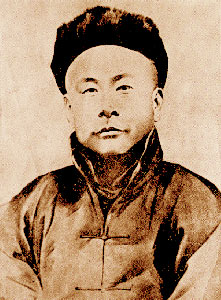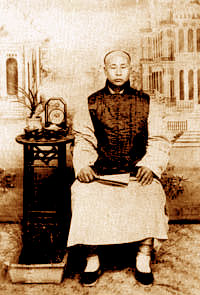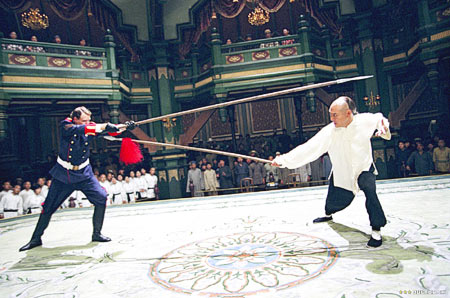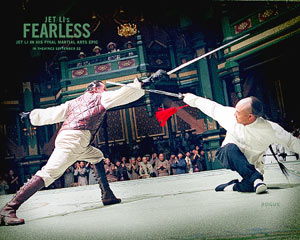|
|
|||
|
Huo Yuan-jia (c.1867-1910) was a Chinese martial artist and founder of the Chin Woo Athletic Association, a martial arts school in Shanghai.. A practitioner of the martial art Mízōng, he is considered a hero in China for challenging foreign fighters in highly publicized matches at a time when Chinese sovereignty was being eroded by foreign concessions and spheres of influence.
Huo Yuan-jia was born in 1868 in Xiаonаn Village in Jinghai County in Tianjin, the fourth of his father Huo Endi's ten children. Huo Endi made his living by guarding caravans, as members of families with a long tradition of martial arts like the Huos often did, but the family's primary source of income was from farming.It was his father from whom Huo Yuan-jia learned martial arts, specifically his family's style of Mízōngyì. His learning of martial arts did not come by default for Huo's father did not intend him to follow his footsteps. Huo initially learned Mi Zong Quan in secrecy, until his progress was discovered by his father. In 1890, a wushu master by the name of Du came from Henan Province to visit Huo's father. His manner provoked a trial of strength with the boxers of the family. Thus, Huo competed with him and defeated Du. The bout made Huo Yuan-jia famous in his village and the neighbouring areas. Huo later took jobs from a local loan collector as well as his friend in the herb trading business, who participated in Dr. Sun Yatsen's plan to overthrow the Manchurian government.
In 1909, Huo, accompanied by his apprentices Liu Zhensheng and Zhang Wenda, traveled to Shanghai to accept an open challenge posed by a British boxer named Hercules O'Brien. The match was preceded by disagreement over what rules it would be governed by. O'Brien insisted on Western boxing rules limiting attacks to punches above the waist. Huo, on the other hand, was more accustomed to the rules of Chinese leitai challenge matches, which lacked such restrictions. They finally agreed that the first person to knock down his opponent would be considered the winner; however, the match never took place and Hercules O'Brien fled the area before the date of the match.
In 1910, Huo opened the Chin Woo Athletic Association, a martial arts school at Shanghai's north gate. According to Huo's grandson, Huo's death came after the defeat of the 10 members of the Japanese Judo team. During a subsequent dinner with his opponents, Huo's illness (perhaps tuberculosis) prompted the Japanese to offer medical help, but he suffered a severe and fatal reaction to the medication given by the Japanese doctor. Huo died approximately 70 days after the founding of the Chin Woo association. It is often alleged that his death was caused by being poisoned by the Japanese, an allegation repeated by Huo's offspring.
Popular media
Interesting fact: In the Jet Li's latest film, Fearless, the cavalry officer with the spear is played by a German actor and Wing Tsun instructor, Brandon Rhea.
The films Fist of Fury (starring Bruce Lee) and its remake Fist of Legend are highly-fictionalized accounts of the events following his death. Recent films have also included a student by the name of Chen Zhen ( who was portrayed by Bruce Lee in Fist of Fury), who has been determined to be a highly fictionalized character. Jet Li's latest film, Fearless, is also greatly fictionalized as the stories about Huo's family and the actual matches were far from reality; in the film, a fictionalized Huo defeats challengers from four foreign countries. The grandson of Huo Yuan-jia, Huo Shoujin, filed a lawsuit March 7, 2006, claiming that the movie dishonored Huo Yuan-jia by fabricating information about his life and portraying him as a wealthy man who was childless -- Huo Yuan-jia had two sons and two daughters, and one of his great grand daughters still carries on his legacy as a martial artist.
Sources: www.arikah.com/encyclopedia/Huo_Yuanjia, www.chinwoo.org/history.htm, www.china.org.cn, www.storage.canalblog.com
|
|||
|
|
|||

 Huo is well-known for his challenge matches
with foreign fighters. It was a 1901 encounter with a Russian
wrestler in Xiyuan Park, Tianjin that first made Huo famous. The
wrestler had openly insulted the Chinese, calling them "Asian
weaklings" or "Sick Man Of the East" because no one would accept
his challenge to a fight. When Huo challenged him, the Russian
forfeited, suggesting that he was merely putting on a
performance in order to make a living. Huo then demanded that
the Russian write an apology in the newspaper, which the Russian
reportedly obliged.
Huo is well-known for his challenge matches
with foreign fighters. It was a 1901 encounter with a Russian
wrestler in Xiyuan Park, Tianjin that first made Huo famous. The
wrestler had openly insulted the Chinese, calling them "Asian
weaklings" or "Sick Man Of the East" because no one would accept
his challenge to a fight. When Huo challenged him, the Russian
forfeited, suggesting that he was merely putting on a
performance in order to make a living. Huo then demanded that
the Russian write an apology in the newspaper, which the Russian
reportedly obliged.
